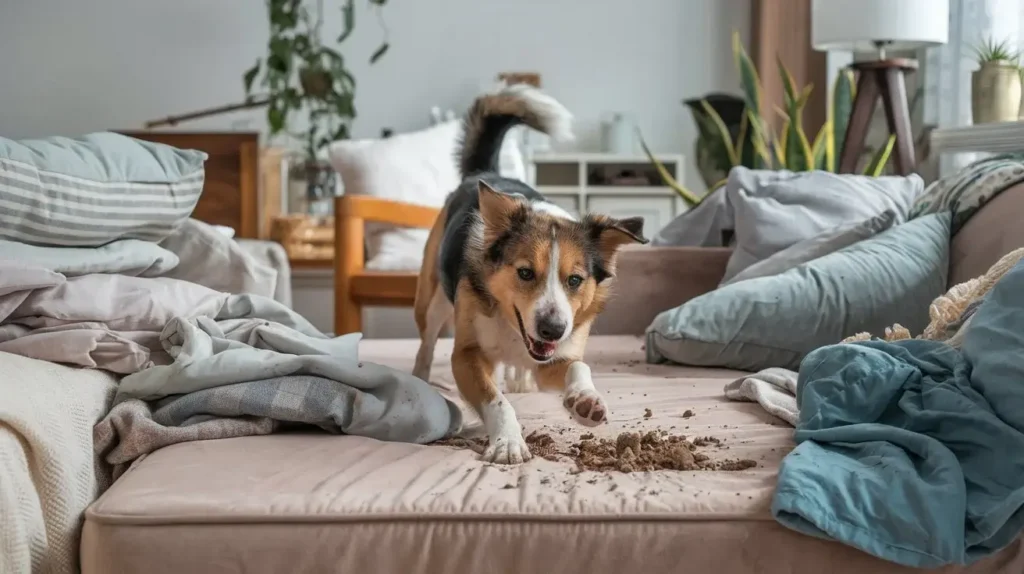Have you ever wondered why dogs dig on beds and couches? If so, you’re certainly not alone in this puzzlement. Indeed, this peculiar behavior can be both endearing and frustrating for pet owners. In this comprehensive guide, we’ll therefore delve deep into the reasons behind this common canine quirk and, subsequently, provide you with practical solutions to manage it effectively.
The Instinctual Drive: Exploring Why Dogs Dig on Beds and Couches
First and foremost, it’s important to understand that dogs are fascinating creatures with a rich evolutionary history. Consequently, this history continues to influence their behavior today. To fully grasp why dogs dig on beds and couches, we must hence explore the instinctual drives that motivate our canine companions.
Ancestral Instincts: The Root Cause of Why Dogs Dig on Soft Surfaces
Primarily, digging is a natural behavior for dogs, deeply rooted in their ancestral past. In fact, wild canines often dig for various reasons:
- Creating dens: In the wild, dogs’ ancestors would dig dens for shelter and protection.
- Hunting prey: Digging was essential for catching burrowing animals.
- Hiding food: Burying excess food was a way to preserve it for later consumption.
- Regulating body temperature: Digging into cool earth provided relief from heat.
As a result, when we observe dogs digging on beds and couches, they’re often expressing these deep-seated instincts in a domesticated setting.
Comfort-Seeking Behavior: Why Dogs Dig to Create the Perfect Spot
Moreover, another reason why dogs dig on beds and couches is their innate desire for comfort. Just as their wild ancestors would create the perfect resting spot by digging and circling, our pets often engage in similar behaviors to make their sleeping area more comfortable. This process, known as “nesting,” typically involves:
- Fluffing up the bedding: Dogs may dig and scratch to create a softer surface.
- Adjusting temperature: Digging can help expose cooler layers of bedding or create a warmer nest.
- Marking territory: The act of digging releases scent from the paws, marking the area as the dog’s own.
By understanding these comfort-seeking behaviors, we can therefore empathize with our furry friends and provide them with appropriate alternatives.

Psychological Factors: Why Do Dogs Dig on Beds and Couches for Emotional Reasons?
While instinct plays a significant role in why dogs dig on beds and couches, there are also psychological factors at play. Let’s thus examine some of the emotional reasons behind this behavior.
Anxiety and Stress Relief: How Digging Helps Dogs Cope
To begin with, dogs, like humans, can experience anxiety and stress. Consequently, digging can serve as a coping mechanism for dogs dealing with:
- Separation anxiety: When left alone, some dogs may dig as a way to self-soothe.
- Environmental changes: New surroundings or changes in routine can trigger digging behaviors.
- Overstimulation: After an exciting day, digging can help dogs calm down and relax.
Recognizing these emotional triggers is therefore crucial in addressing the root cause of excessive digging behavior.
Attention-Seeking Behavior: When Dogs Dig to Get Your Notice
Furthermore, sometimes the answer to “Why do dogs dig on beds and couches?” is simply that they’re trying to get your attention. In fact, dogs are social animals and crave interaction with their human family members. If they’ve learned that digging elicits a response from you, they may consequently continue this behavior to:
- Initiate play: Some dogs dig to invite their owners to engage in playtime.
- Seek affection: Digging might be a way to prompt petting or cuddling.
- Express boredom: Understimulated dogs may dig to alleviate boredom and seek interaction.
By understanding these attention-seeking behaviors, you can thus redirect your dog’s energy more positively.
Health-Related Reasons: When Digging on Beds and Couches Signals a Problem
While most instances of dogs digging on beds and couches are benign, there are times when this behavior might indicate underlying health issues. It’s therefore essential to be aware of these potential problems to ensure your pet’s well-being.
Physical Discomfort and Pain: Why Dogs May Dig to Find Relief
In some cases, excessive digging on soft surfaces like beds and couches might be a sign of:
- Joint pain: Dogs with arthritis or hip dysplasia may dig to create a more comfortable position.
- Skin irritations: Allergies or parasites can cause itching, leading to digging and scratching.
- Digestive issues: Dogs with upset stomachs might dig to find a position that alleviates discomfort.
If you notice a sudden increase in digging behavior accompanied by other symptoms, it’s consequently crucial to consult with your veterinarian.
Hormonal Changes and Pregnancy: Understanding Nesting Behaviors
Additionally, female dogs may exhibit increased digging behavior due to hormonal changes, particularly during pregnancy. This nesting instinct is, in fact, a natural preparation for giving birth and caring for puppies. If you think your dog may be expecting, it’s crucial to:
- Consult your vet: Confirm the pregnancy and discuss proper care.
- Provide appropriate nesting areas: Offer safe, comfortable spaces for your dog to nest.
- Monitor behavior: Keep an eye on changes in digging patterns as the pregnancy progresses.
Understanding these health-related reasons can therefore help you determine when digging behavior warrants medical attention.
Environmental Factors: How Your Home Influences Why Dogs Dig on Beds and Couches
The environment that your dog lives in plays a major role in shaping his behavior. For this reason, let us take into consideration some elements related to your home that can make your dog develop this habit of digging into beds and couches.
Temperature Regulation: Why Dogs Dig to Stay Comfortable
One of the primary reasons why dogs dig on beds and couches is to regulate their body temperature. Your home’s climate can thus influence this behavior:
- Warm environments: Dogs may dig to expose cooler layers of bedding or flooring.
- Cold rooms: Digging can help create a warmer nest by bunching up blankets or cushions.
- Drafty areas: Dogs might dig to escape air currents and find a more comfortable spot.
Ensuring your dog has access to comfortable resting areas with appropriate temperatures can consequently help reduce digging behavior.
Sensory Stimulation: How Textures and Scents Trigger Digging
Moreover, the textures and scents in your home can also trigger digging behaviors:
- Soft fabrics: Plush carpets, fluffy blankets, and soft couches may remind dogs of dirt, encouraging digging.
- New scents: Recent changes in laundry detergent or air fresheners might prompt investigative digging.
- Buried treasures: Dogs may dig if they smell food crumbs or other interesting scents in furniture.
Managing these sensory stimuli can therefore help minimize unwanted digging on your furniture.

Breed-Specific Tendencies: Why Some Dogs Dig More Than Others on Beds and Couches
Dogs dig on beds and couches for myriad reasons, but basically, one has to consider the fact that some breeds are generally more inclined towards digging than others, which can be in relation to their intended purpose and genetic predisposition.
Terriers: The Natural Diggers of Beds and Couches
Terrier breeds, such as Jack Russell Terriers, Yorkshire Terriers, and West Highland White Terriers, were originally bred for hunting small prey that burrow underground. Consequently, these breeds often exhibit strong digging instincts, even in domestic settings. If you own a terrier, you might notice:
- Persistent digging: A strong drive to dig, even when discouraged.
- Quick, energetic movements: Rapid scratching and digging motions.
- Focused behavior: Intense concentration during digging activities.
Understanding these breed-specific traits can help you provide appropriate outlets for your terrier’s natural instincts.
Northern Breeds: Why Arctic Dogs Dig on Soft Surfaces
The Arctic breeds, including Huskies, Malamutes, and Samoyeds, were bred in cold countries, so the instinct to dig remains. In their native habitat, dog ancestors would dig themselves a snow den for sheltering and warmth. They show this tendency in bed and couch digging when living in modern homes:
- Circular digging patterns: Mimicking the creation of a snow den.
- Seasonal changes: Increased digging behavior during warmer months.
- Preference for cool surfaces: Seeking out spots that feel similar to snow or cold ground.
Providing cool resting areas and appropriate digging alternatives can help manage this behavior in northern breeds.
Training and Management: Effective Strategies to Address Why Dogs Dig on Beds and Couches
Now that we’ve explored the various reasons why dogs dig on beds and couches, let’s discuss practical strategies to manage this behavior effectively.
Positive Reinforcement: Teaching Dogs Not to Dig on Furniture
One of the most effective ways to address digging behavior is through positive reinforcement training:
- Redirect and reward: When you catch your dog starting to dig, redirect them to an appropriate activity and reward them for compliance.
- Teach the “leave it” command: Use this command to interrupt digging behavior before it starts.
- Consistency is key: Ensure all family members are on board with the training approach for best results.
Remember, patience and persistence are crucial when implementing any training program to address why dogs dig on beds and couches.
Providing Alternatives: Satisfying the Urge to Dig
Offering your dog suitable alternatives can help satisfy their digging instincts without damaging your furniture:
- Designated digging areas: Create a sandbox or specific area in your yard where digging is allowed.
- Puzzle toys: Use interactive toys that require “digging” to access treats.
- Comfortable bedding: Provide plush, comfortable beds that satisfy your dog’s nesting instincts.
By offering these alternatives, you can redirect your dog’s natural behaviors in a positive way and reduce their tendency to dig on beds and couches.
Environmental Management: Preventing Digging on Furniture
Making changes to your dog’s environment can help reduce the urge to dig on beds and couches:
- Limit access: Use baby gates or close doors to keep dogs away from furniture when unsupervised.
- Cover furniture: Use protective covers on beds and couches to make them less appealing for digging.
- Provide engaging toys: Ensure your dog has plenty of stimulating toys to keep them occupied.
These environmental changes can help break the habit of digging on furniture and address the root causes of why dogs dig on beds and couches.

When to Seek Professional Help for Dogs Digging on Beds and Couches
If you’ve tried various strategies and still find yourself wondering, “Why do dogs dig on beds and couches?” you might want to seek advice from a specialist:
- Veterinary check-up: Rule out any underlying health issues that might be causing the behavior.
- Professional dog trainer: A certified trainer can provide personalized strategies to address digging behavior.
- Animal behaviorist: For severe or persistent cases, an animal behaviorist can offer in-depth analysis and tailored solutions.
Don’t hesitate to seek expert help if you’re struggling to manage your dog’s digging behavior on beds and couches.
Conclusion: Understanding and Managing Why Dogs Dig on Beds and Couches
In conclusion, we’ve explored a wide range of factors that answer the question, “Why do dogs dig on beds and couches?” From instinctual drives to environmental influences, understanding these root causes equips you to address the behavior effectively and compassionately.
Remember, digging is one of the dog’s natural behaviors; frustrating, probably, when your furniture bears the brunt, but patience and understanding are called for. Providing adequate alternatives, training through positive reinforcement, and making necessary changes in the environment will eventually allow your furry buddy to vent their digging instinctive behavior in a manner acceptable to both of you.
The secret for dealing with digging behavior at the end of the day includes building trust, communication, and respect between him and you. With time, effort, and consistency, you can guide your canine companion into more desirable behaviors while still indulging in natural instincts.
Next time you catch your dog starting to dig into your bed or couch, take a while considering the underlying motives and respond in a way that shows empathy and understanding. Your furry friend will appreciate it, and you therefore will live a more harmonious life with your beloved pet.








